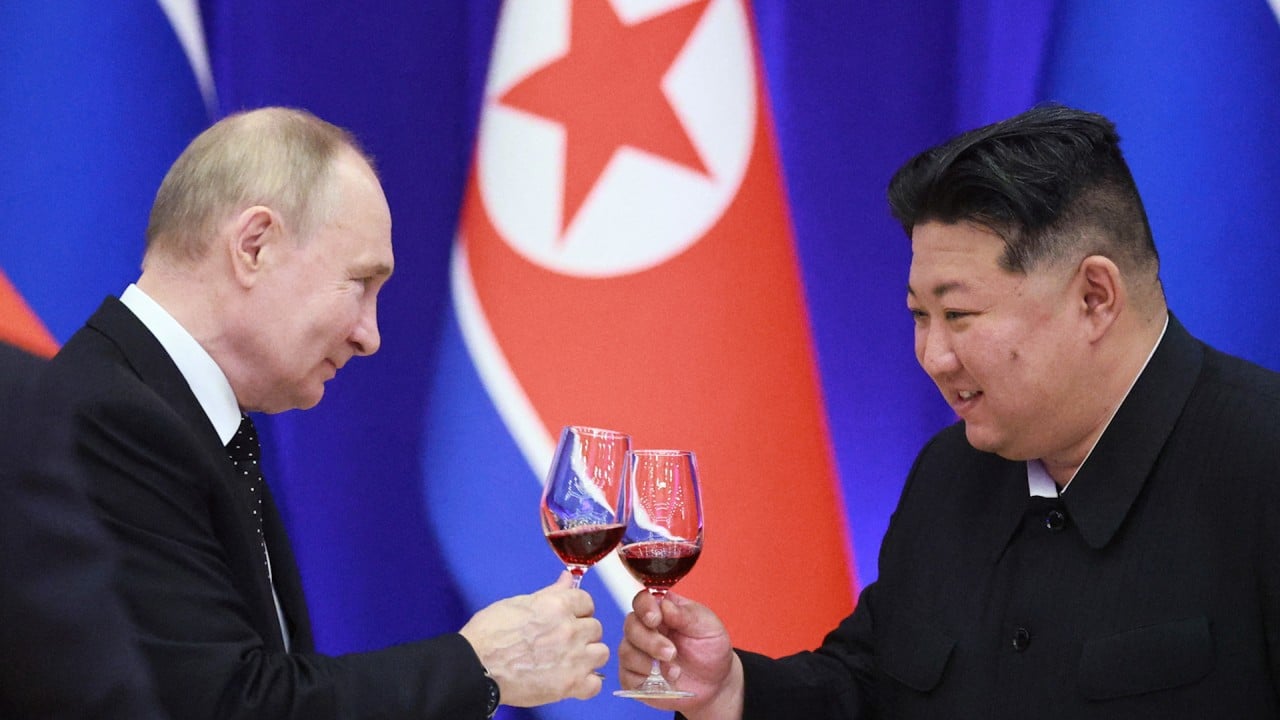China has been trying to persuade Russia and North Korea to open a stretch of the Tumen River to Chinese cargo shipping for decades, a step that would provide direct access to the sea from the landlocked northeastern province of Jilin.
Although its hopes may have been raised by Russian President Vladimir Putin’s comments following his recent visits to Beijing and Pyongyang the issue could still test the strength of the three-way relations.
Despite their close ties with Beijing, both Russia and North Korea still have reservations about allowing Chinese shipping – especially its navy – access to a key waterway while some analysts believe Beijing may be wary about getting too close to the pair for fear of further harming its relations with the West.
In a joint statement issued after Putin’s meeting with his Chinese counterpart Xi Jinping in Beijing in May, the pair agreed to hold a “constructive dialogue” with North Korea about letting Chinese ships sail through the lower Tumen River to the Sea of Japan, or East Sea.
The three countries were expected to talk about this “soon”, Nikkei Asia reported last month, citing unnamed sources.
The river forms part of North Korea’s border with both of its neighbours, but a 17km (10½-mile) stretch along the Russian border is largely unnavigable for freight vessels because of a Soviet-era railway bridge linking the two sides.
During Putin’s recent visit to North Korea the two countries signed an agreement to build a new cross-border road bridge – a move some observers believe might lead to the demolition of the old bridge, making the route more accessible for shipping.
However, others doubt that Pyongyang and Moscow would want to open the route to Chinese shipping – especially warships.
Li Lifan, an specialist in Russian and Central Asian studies at the Shanghai Academy of Social Sciences, said that after years of talks it would “be a strategic win and a dream come true” for China to open up the river.
“China can shorten the freight voyage to Japan and Europe and reduce costs through the sea outlet on the Tumen River.
“Russia in return will be able to fully develop its Far East region with China’s help, with Chinese investments pouring in to stimulate local economic growth,” Li said, adding that it would help Moscow counter the impact of Western sanctions.
Both Russia and North Korea have historically been reluctant to see China gaining more influence in that region, where historical grievances fester about it being forced to cede territory to Russia in the 19th century when the Tsarist empire took advantage of China’s weakness to secure what is now the port of Vladivostok.
Li said Putin appeared to have changed his mind by agreeing to work with China to develop the Tumen link to the sea, and if Beijing was willing to pay for the new bridge “I don’t see why Pyongyang and Moscow would refuse such an offer”.
“When a new bridge is built, it is fairly likely, and preferable from China’s perspective, to have the old bridge demolished, which would clear the main obstacle for the navigation of big cargo ships,” Li added.
Stephen Nagy, a professor at International Christian University in Tokyo, said: “Opening the Tumen River to shipping does provide China more diversity in terms of export routes, the ability to project power into the Sea of Japan, and potential access to the Arctic, an area that is seen as important for shipping, resources and competition.”
But both Moscow and Pyongyang “may find it distasteful to have Chinese naval vessels navigating through their waters”, according to Nagy.
“Remember, both North Korea and Russia are conscious and anxious about China’s long-term intentions for the Far East, anxieties that flare when Chinese counterparts make faux pas about how the territories now part of Russia and North Korea used to be Chinese,” he said.
Artyom Lukin, an associate professor at Russia’s Far Eastern Federal University in Vladivostok, said it was too early to say Moscow and Pyongyang would agree to Beijing’s demands for an outlet to the Sea of Japan.
“As far as I understand, there are no plans or agreements to demolish the existing cross-border railway bridge between Russia and North Korea.
“The agreement signed in Pyongyang during Putin’s recent visit calls for the construction of another vehicle bridge. So there will be two Russian-North Korean bridges on the lower riches of the Tumen River instead of one,” he said.

“I don’t think Russia and North Korea have an interest in allowing Chinese cargo … into the Sea of Japan. For one thing, if China gets direct access to the Sea of Japan, it would threaten the business of Russian and North Korean ports on the Sea of Japan, such as Vladivostok, Nakhodka and [Rason – a North Korean port formerly known as Rajin-Sonbong].”
Instead, Moscow might allow Beijing to use the Tumen for tourist and pleasure cruises, but “freight shipping, and especially naval navigation, on the lower reaches of the Tumen seems a rather unlikely prospect at the moment,” he said.
However, Lukin went to say that “nothing is impossible. At some point, Russia, North Korea and China might agree to the conditions to open up full-scale navigation on the Tumen. But this is not the cards right now.”
Natasha Kuhrt, a senior lecturer in international peace and security at King’s College London, said Russia was concerned about giving Chinese warships access to the Sea of Japan.
“It would be a massive undertaking to make the river navigable in fact, because it is too shallow at the moment and the cost of regular dredging would be huge. Of course it would be beneficial for China and at the moment it has to pay North Korea for use of the Rajin port,” she said.
She also said: “I don’t think China would want to be locked into any kind of alliance with Pyongyang. China doesn’t ‘do alliances’ in any case. Beijing doesn’t have control over the regime there.”
Nagy agreed, saying: “I do not see steps towards an alliance. China does not want to get involved in Putin’s reckless war [in Ukraine] or with the unpredictable Kim Jong-un regime.”
Pang Zhongying, a professor of international affairs at Sichuan University, argued Beijing may not have much to gain from its deepening alignment with its two neighbours.
“Given the complexity in the China-Russia-North Korea triangle, what Putin did is probably just another hollow promise because it’s highly unlikely that China would be allowed to have an outlet to the Sea of Japan,” he said.
“In fact, even if the lower Tumen River opens for shipping, China may still need permission from Russia and North Korea to use it.”
He said China was at a crossroads and would have to choose between the West and Russia as it looked to fix its own economic problems, but picking Moscow and Pyongyang would not solve these problems “and would not bode well for its international image in the midst of the Ukraine war”.




